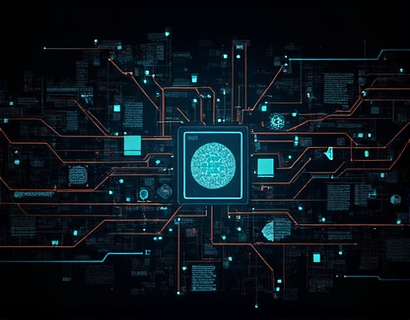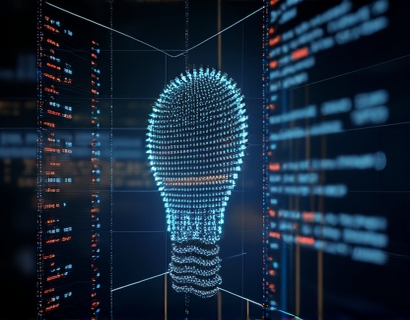Revolutionizing Productivity: The Synergy of AI and Cryptocurrency in the Digital Age
The integration of artificial intelligence (AI) and cryptocurrency is ushering in a new era of productivity transformation. This convergence of advanced technologies is not just a trend but a fundamental shift in how we approach workflows and daily tasks. For tech innovators and early adopters, the potential of AI and cryptocurrency to enhance efficiency and innovation is immense. This article delves into the ways these technologies are reshaping the digital landscape, offering insights and examples of how they are being leveraged to create more efficient, secure, and user-friendly applications.
Understanding AI and Cryptocurrency
To fully appreciate the impact of AI and cryptocurrency on productivity, it's essential to understand each technology individually. Artificial intelligence refers to the simulation of human intelligence processes by machines, particularly computer systems. These processes include learning (the acquisition of information and rules for using it), reasoning (using rules to reach approximate or definite conclusions), and self-correction. AI technologies such as machine learning, natural language processing, and computer vision are already transforming various industries by automating tasks, providing insights from data, and enhancing user interactions.
Cryptocurrency, on the other hand, is a digital or virtual currency that uses cryptography for security. It operates on a decentralized network, typically a blockchain, which ensures transparency and immutability. Cryptocurrencies like Bitcoin, Ethereum, and others have gained significant traction beyond being mere digital currencies, serving as a medium for decentralized applications (dApps) and smart contracts. The combination of AI and cryptocurrency leverages the strengths of both: AI's ability to process and analyze vast amounts of data, and cryptocurrency's secure and transparent transaction capabilities.
Enhancing Workflow Efficiency with AI
AI is revolutionizing productivity by automating repetitive and time-consuming tasks, allowing professionals to focus on higher-value activities. In the context of software development and IT, AI-powered tools can assist in code generation, bug detection, and performance optimization. For instance, AI-driven development platforms can suggest code snippets, complete functions, and even generate entire applications based on user inputs. This not only speeds up the development process but also reduces the likelihood of errors, leading to higher-quality software.
In business operations, AI can streamline workflows through intelligent automation. Robotic Process Automation (RPA) combined with AI can handle routine tasks such as data entry, report generation, and customer service interactions. AI algorithms can analyze patterns in data to predict trends and optimize resource allocation, ensuring that businesses operate more efficiently and effectively. For example, AI can predict peak usage times for servers and adjust resources accordingly, preventing bottlenecks and ensuring smooth operations.
Secure and Transparent Transactions with Cryptocurrency
Cryptocurrency brings a new dimension to productivity by providing a secure and transparent means of transaction. In a world where data breaches and fraud are common concerns, the decentralized nature of blockchain technology ensures that transactions are immutable and verifiable. This level of security is particularly valuable in industries dealing with sensitive information, such as finance, healthcare, and legal services.
Smart contracts, self-executing contracts with the terms directly written into code, are another powerful application of cryptocurrency. They automate and enforce contractual obligations without the need for intermediaries, reducing costs and increasing efficiency. For instance, in supply chain management, smart contracts can automatically trigger payments once delivery is confirmed, ensuring timely and accurate transactions.
Combining AI and Cryptocurrency for Enhanced Productivity
The true potential of AI and cryptocurrency is realized when they are combined. Cryptocurrency provides a secure and decentralized platform for AI applications to operate, ensuring that data and transactions are protected. For example, AI-driven dApps can leverage blockchain to create trustless environments where users can interact without the need for intermediaries. This is particularly useful in areas like decentralized finance (DeFi), where AI algorithms can optimize trading strategies and risk management while ensuring transparency and security.
Another area where AI and cryptocurrency intersect is in the realm of data privacy and ownership. Blockchain technology allows users to control their data and decide who can access it, while AI can process and analyze this data to provide valuable insights. This combination empowers individuals and businesses to leverage their data for better decision-making without compromising privacy. For instance, AI can analyze user-generated data on a blockchain to identify trends and preferences, enabling targeted marketing and personalized services without exposing sensitive information.
Case Studies and Real-World Applications
Several companies and projects are already harnessing the power of AI and cryptocurrency to transform productivity. One notable example is Filecoin, a decentralized storage network that uses blockchain to incentivize data storage providers. By integrating AI, Filecoin can optimize data placement and retrieval, ensuring that users have fast and reliable access to their files. This not only improves performance but also reduces costs associated with traditional storage solutions.
Another example is Compass, a decentralized AI-powered ad platform. Compass uses AI to match advertisers with relevant audiences on decentralized networks, ensuring that ads are displayed ethically and transparently. The use of cryptocurrency in Compass's ecosystem ensures that all transactions are secure and verifiable, reducing the risk of fraud and increasing trust among users.
Challenges and Considerations
While the combination of AI and cryptocurrency offers numerous benefits, there are also challenges and considerations to keep in mind. One of the primary concerns is the regulatory environment. As both AI and cryptocurrency are still evolving, regulations are often lagging behind, creating uncertainty for businesses and developers. It's crucial to stay informed about legal requirements and ensure compliance to avoid potential issues.
Another challenge is the technical complexity involved in integrating AI and cryptocurrency. Developing robust and secure systems requires expertise in both domains, which can be a barrier for some organizations. However, as the ecosystem matures, more user-friendly tools and platforms will emerge, making it easier for businesses to adopt these technologies.
Future Prospects
The future of AI and cryptocurrency in enhancing productivity is bright. As technology continues to advance, we can expect more innovative applications and integrations. For instance, the development of AI-powered virtual assistants on blockchain-based platforms could revolutionize how we manage personal and professional tasks. These assistants could handle scheduling, reminders, and even complex decision-making processes, all while ensuring data security and privacy.
Moreover, the rise of Web3, a decentralized internet powered by blockchain, AI, and other emerging technologies, promises a more equitable and user-centric digital landscape. In this environment, users will have greater control over their data and online identities, and AI will play a crucial role in personalizing experiences and optimizing interactions.
In conclusion, the synergy between AI and cryptocurrency is transforming productivity in profound ways. By automating tasks, ensuring secure transactions, and providing valuable insights, these technologies are reshaping the way we work and interact in the digital world. For tech innovators and early adopters, embracing this convergence offers a competitive edge and opens up new possibilities for innovation and growth.










































